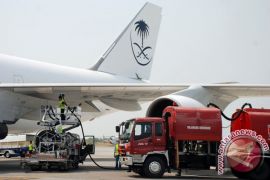The Cleveland Volcano, located on an uninhabited island 940 miles (1,500 km) southwest of Anchorage, had been oozing lava and gas since July.
Ash from the 5,676-foot (1,730 metre) volcano is considered potentially dangerous to aircraft because Cleveland`s peak lies directly below commercial flight paths between Asia and North America.
Additional explosions producing larger ash clouds are possible and could come without warning, the observatory said.
Jet engines are vulnerable to damage and sudden failure if they suck in gritty volcanic dust.
A KLM airliner abruptly dropped more than 14,000 feet when it flew through ash belched into the atmosphere from an eruption of the Mount Redoubt volcano, just west of Cook Inlet, in 1989.
The badly damaged jet landed in Anchorage.
Thursday`s explosion, captured by satellite imagery, likely stemmed from a gradual buildup of pressure during months of intermittent low-level eruptions, said Dave Schneider, a geophysicist with the Alaska Volcano Observatory.
The last significant eruption at Cleveland was in 2001, when the volcano unleashed three explosions that spewed ash as high as 39,000 feet, spilled a stream of lava from the summit crater and unleashed an avalanche of molten rock, according to the observatory. Cleveland also erupted in 2009, with smaller ash emissions.
The volcano encompasses about half the uninhabited Chuginadak Island. The nearest human settlement is Nikolski, a tiny Aleut village located about 45 miles to the east.
Although Cleveland is among the most active of Alaska`s roughly 90 volcanoes, no seismic equipment or cameras are set up there for continuous monitoring because of its remote location.
Scientists keep tabs with satellite data, witness reports and video from mariners and pilots in the area.
Interference with air travel is the most immediate risk posed by Alaskan volcanoes. But they are not alone.
An ash cloud from a Chilean volcano grounded flights across eastern and southern Australia in June. The eruption of an Icelandic volcano in 2010 led to 100,000 canceled flights, hampering the air travel of some 10 million people.
Reuters
Editor: Jafar M Sidik
Copyright © ANTARA 2011








